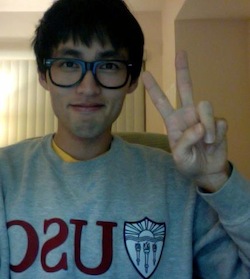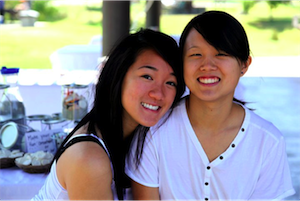Asian And Gay

“Faggot.”
Now 21, Cho looks back on the memory as the first time he felt attacked for his sexuality.
“I felt hurt that someone genuinely hates the fact that I’m gay,” Cho said. “In retrospect, I feel like that made me stronger because I realized that those are just words and that I’m better than that.”
Although he said has felt different since he was eight, Cho did not come out to anyone until he was in high school. When Cho did come out to his mother, he was met with disappointment rather than unconditional support and acceptance.
“It’s more difficult for Asian Americans to come out because Asians tend to be a bit more conservative in terms of gay rights and issues,” Cho explained. “Koreans are very rooted in Confucianism and in Asian cultures, we have to produce offspring…it’s kind of like a duty that kids have to do for their parents.”
Cho’s mother said she still loved her son, despite her disapproval of his sexuality. Some other Asian Americans have been faced with more extreme condemnation
Brittany Cheng, 20, said although her father and siblings were generally supportive of her being gay, her mother’s reaction was almost like “something out of a television show.”
“She was on the floor, crying and screaming and rolling around,” Cheng said. “She was in complete hysterics.”
It has been a year and a half since Cheng came out to her family and she says that even now, her siblings encourage her to act and dress "straight".
“They say, ‘Oh, don’t wear men’s clothing around our parents’ because obviously it will piss off Mom,” Cheng said. “It’s a form of respect, which I understand… going home is so bittersweet, I get to see my family but I have to censor myself when I’m around them.”

Not all parents who react violently cling to their initial sentiments. Angela Lin, 21, said she came out to her family this past spring while they were having dinner in a Chinese restaurant.
Her mother immediately started “freaking out” and tried to blame Lin’s homosexuality on everything from hormones to her fights with Lin’s father. But over time, Lin’s mother has become very accepting of Lin’s girlfriend and of her own daughter.
“I think her worry comes from a good place,” Lin said. “She’s more scared of how other people will treat me and of me not having the best life I can have.”
Although some Asian parents are accepting of their children identifying as LGBTQ (Lesbian, Gay, Bisexual, Transgender, Queer), many of them still hold on to traditional values and mindsets.
Cho said that second-generation Asian Americans should try to understand their parents' perspective but remain brave enough to come out to them.
“Your parents are born in a different culture and they carry that with them when they come here,” Cho said. “They might flip out and they might not. Maybe they’ll accept you for who you are. No matter what happens, they’re still parents and deep down they’ll still love you.”
Gloria Leung, 20, said that from an early age, her mother expressed the desire for her to marry a rich Chinese businessman who will pamper her. To her mother, the traditional way was the best way.
“It’s interesting how being gay doesn't fit into that model,” Leung said with a laugh.
Cho, a second-generation Korean-American, said he thinks Asian Americans are lucky because of the strong LGBTQ community in America.
“There’s definitely less of a support system in Asia,” Cho, who attends the University of Southern California, said. “But since going to college, people are really open-minded. We have a LGBTQ Center and the resources are there and they celebrate gay culture.”
Cheng, an international student from the Philippines, agreed that she has seen more Asian Americans openly accept their sexuality since coming to USC.
“The U.S. is our temporary home,” Cheng said. “For our four years here, we can live as openly as we want to and pray that nothing goes back to the people at home. When we return, a lot of us go back [into the closet].”
Cheng said the reason why LGBTQ-identifying Asians and Asian Americans sometimes seem less common than LGBTQ-identifying people of other ethnicities is because the culture is based on “saving face” and is more passive.
“We prefer not to cause much conflict,” Cheng said. “Asian Americans are a bit more conservative and not very vocal unless they’re provoked or asked by other people. But I think we need to find a good medium not to be too aggressive but to have our needs met.”
In the end, Cho encouraged LGBTQ-identifying Asian Americans to be proud of who they are.
“Don’t be ashamed,” Cho said. “Don’t worry too much to how people will react. If people react negatively, then that’s their loss. You don’t need to be friends with people who don’t accept you as you are.”
Reach Staff Reporter Grace Wong here and follow her on Twitter.



